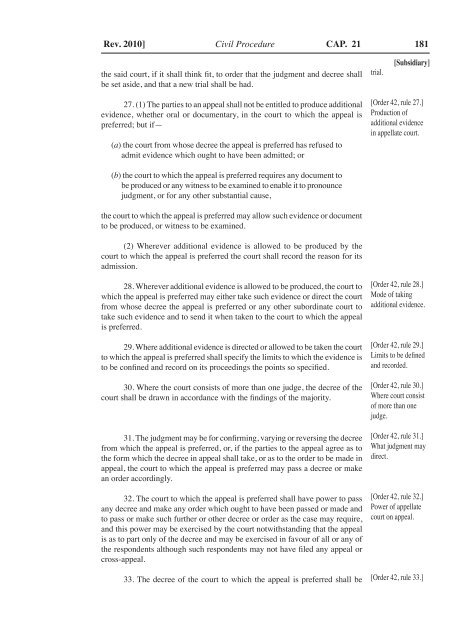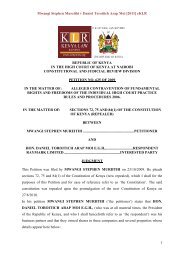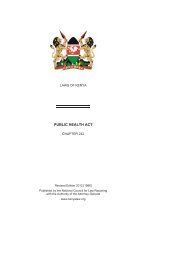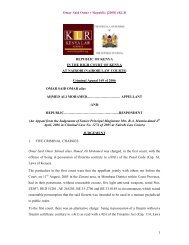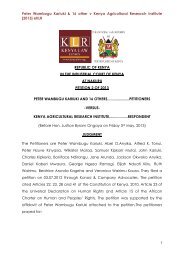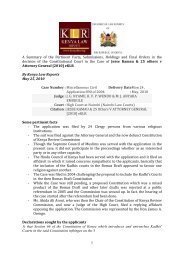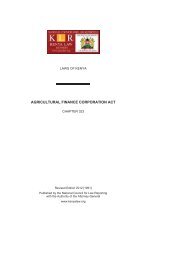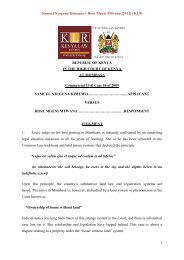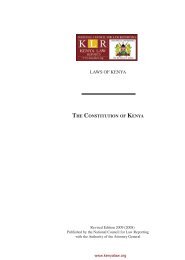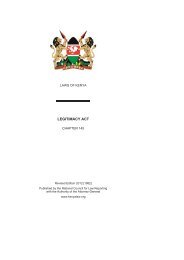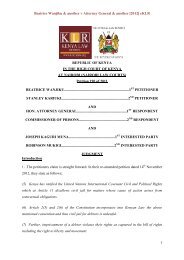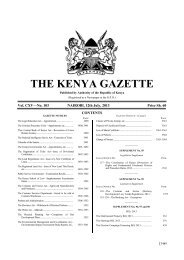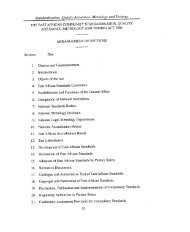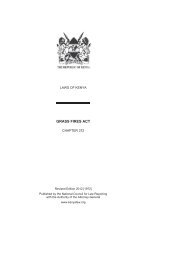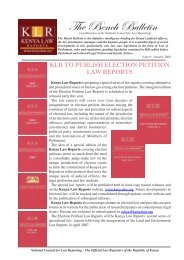the civil procedure act - Kenya Law Reports
the civil procedure act - Kenya Law Reports
the civil procedure act - Kenya Law Reports
You also want an ePaper? Increase the reach of your titles
YUMPU automatically turns print PDFs into web optimized ePapers that Google loves.
Rev. 2010] Civil Procedure CAP. 21 181be set aside, and that a new trial shall be had.trial.[Subsidiary]27. (1) The parties to an appeal shall not be entitled to produce additionalevidence, whe<strong>the</strong>r oral or documentary, in <strong>the</strong> court to which <strong>the</strong> appeal ispreferred; but if—(a) <strong>the</strong> court from whose decree <strong>the</strong> appeal is preferred has refused toadmit evidence which ought to have been admitted; or[Order 42, rule 27.]Production ofadditional evidencein appellate court.(b) <strong>the</strong> court to which <strong>the</strong> appeal is preferred requires any document tobe produced or any witness to be examined to enable it to pronouncejudgment, or for any o<strong>the</strong>r substantial cause,<strong>the</strong> court to which <strong>the</strong> appeal is preferred may allow such evidence or documentto be produced, or witness to be examined.(2) Wherever additional evidence is allowed to be produced by <strong>the</strong>court to which <strong>the</strong> appeal is preferred <strong>the</strong> court shall record <strong>the</strong> reason for itsadmission.28. Wherever additional evidence is allowed to be produced, <strong>the</strong> court towhich <strong>the</strong> appeal is preferred may ei<strong>the</strong>r take such evidence or direct <strong>the</strong> courtfrom whose decree <strong>the</strong> appeal is preferred or any o<strong>the</strong>r subordinate court totake such evidence and to send it when taken to <strong>the</strong> court to which <strong>the</strong> appealis preferred.29. Where additional evidence is directed or allowed to be taken <strong>the</strong> courtto which <strong>the</strong> appeal is preferred shall specify <strong>the</strong> limits to which <strong>the</strong> evidence is30. Where <strong>the</strong> court consists of more than one judge, <strong>the</strong> decree of <strong>the</strong>from which <strong>the</strong> appeal is preferred, or, if <strong>the</strong> parties to <strong>the</strong> appeal agree as to<strong>the</strong> form which <strong>the</strong> decree in appeal shall take, or as to <strong>the</strong> order to be made inappeal, <strong>the</strong> court to which <strong>the</strong> appeal is preferred may pass a decree or makean order accordingly.[Order 42, rule 28.]Mode of takingadditional evidence.[Order 42, rule 29.]and recorded.[Order 42, rule 30.]Where court consistof more than onejudge.[Order 42, rule 31.]What judgment maydirect.32. The court to which <strong>the</strong> appeal is preferred shall have power to passany decree and make any order which ought to have been passed or made andto pass or make such fur<strong>the</strong>r or o<strong>the</strong>r decree or order as <strong>the</strong> case may require,and this power may be exercised by <strong>the</strong> court notwithstanding that <strong>the</strong> appealis as to part only of <strong>the</strong> decree and may be exercised in favour of all or any ofcross-appeal.[Order 42, rule 32.]Power of appellatecourt on appeal.33. The decree of <strong>the</strong> court to which <strong>the</strong> appeal is preferred shall be[Order 42, rule 33.]


